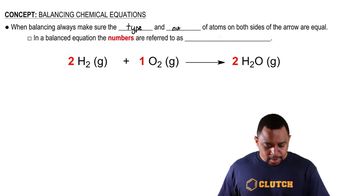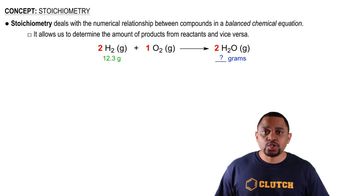Write a balanced chemical equation for the reaction that occurs when (c) the hydrocarbon styrene, C8H81l2, is combusted in air
Ch.3 - Chemical Reactions and Reaction Stoichiometry
Chapter 3, Problem 20b
Write a balanced chemical equation for the reaction that occurs when (b) silver(I) oxide decomposes into silver metal and oxygen gas when heated
 Verified step by step guidance
Verified step by step guidance1
Identify the reactant and the products in the reaction. In this case, the reactant is silver(I) oxide, and the products are silver metal and oxygen gas.
Write the unbalanced equation by placing the reactant on the left side and the products on the right side of the equation. It should look like this: \( \text{Ag}_2\text{O} \rightarrow \text{Ag} + \text{O}_2 \).
Balance the number of silver atoms on both sides of the equation. Since there are two silver atoms in silver(I) oxide, you should have two silver atoms on the product side: \( \text{Ag}_2\text{O} \rightarrow 2\text{Ag} + \text{O}_2 \).
Check the balance of oxygen atoms. In silver(I) oxide, there is one oxygen atom, and in the product side under oxygen gas, there are two atoms as part of the diatomic molecule \(\text{O}_2\). To balance the oxygen, you need to ensure that the total number of oxygen atoms remains consistent on both sides.
Confirm that all elements are balanced. In this case, the balanced chemical equation should be: \( 2\text{Ag}_2\text{O} \rightarrow 4\text{Ag} + \text{O}_2 \), ensuring that there are equal numbers of each type of atom on both sides of the equation.

Verified Solution
Video duration:
2mWas this helpful?
Key Concepts
Here are the essential concepts you must grasp in order to answer the question correctly.
Decomposition Reactions
Decomposition reactions involve a single compound breaking down into two or more simpler products. In this case, silver(I) oxide (Ag2O) decomposes when heated, resulting in the formation of silver metal (Ag) and oxygen gas (O2). Understanding this type of reaction is crucial for writing balanced chemical equations.
Recommended video:
Guided course

Alcohol Reactions: Dehydration Reactions
Balancing Chemical Equations
Balancing chemical equations is the process of ensuring that the number of atoms for each element is the same on both sides of the equation. This is based on the law of conservation of mass, which states that matter cannot be created or destroyed in a chemical reaction. Proper balancing is essential for accurately representing the reaction.
Recommended video:
Guided course

Balancing Chemical Equations
Stoichiometry
Stoichiometry is the study of the quantitative relationships between the reactants and products in a chemical reaction. It allows chemists to predict the amounts of substances consumed and produced. In the context of the decomposition of silver(I) oxide, stoichiometry helps determine the correct coefficients needed to balance the equation.
Recommended video:
Guided course

Stoichiometry Concept
Related Practice
Textbook Question
938
views
Textbook Question
Write a balanced chemical equation for the reaction that occurs when (d) dimethylether, CH3OCH31g2, is combusted in air.
1980
views
1
rank
Textbook Question
Write a balanced chemical equation for the reaction that occurs when (a) titanium metal reacts with O21g2
679
views
Textbook Question
Balance the following equations and indicate whether they are combination, decomposition, or combustion reactions: (a) C3H6(s) + O2(g) → CO2(g) + H2O(l)
415
views
Textbook Question
Balance the following equations and indicate whether they are combination, decomposition, or combustion reactions: (b) NH4NO3(s) → N2O(g) + H2O(g)
337
views
Textbook Question
Balance the following equations and indicate whether they are combination, decomposition, or combustion reactions: a. PbCO3(s) → PbO(s) + CO2(g)
2
views
